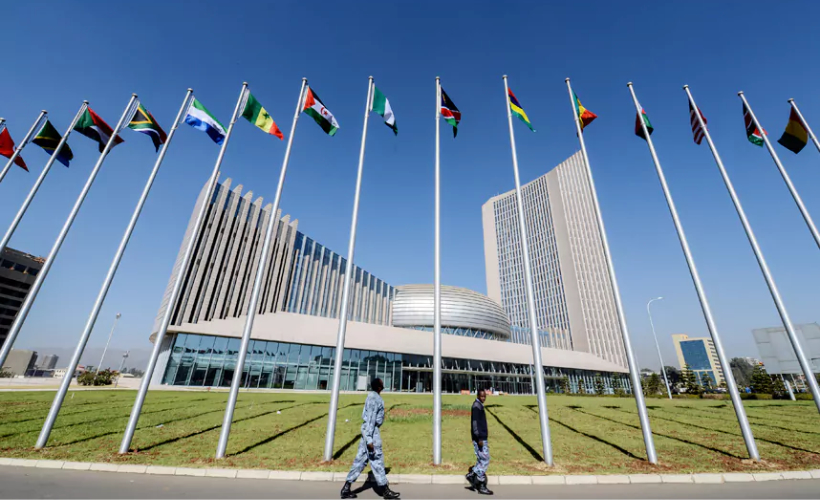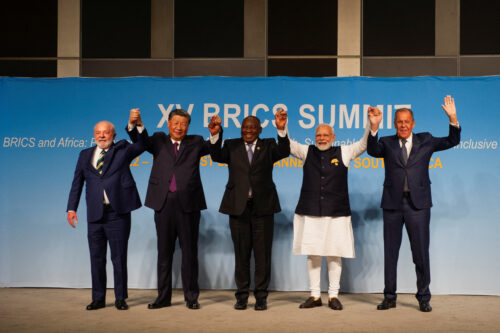China denies report of bugging African Union building, AU diplomat says ‘at least they have never colonized us’
Bugs installed in desks and walls transmitted data from Addis Ababa, Ethiopia to Shanghai in the middle of the night for over five years, Le Monde reports. What impact will this report have on China-Africa relations?

In 2012, China gave an important gift to the chief diplomatic institution of the African continent, the African Union (AU), which at that time was barely a decade old. A gleaming new headquarters complex, worth $200 million, was constructed entirely on China’s dime in Addis Ababa, Ethiopia.
A China Daily article at the time said that the building “shows [China-Africa] partnership entering era of hope,” and boasted that it is “China’s largest aid project to Africa since the construction of the Zambia-Tanzania railway in the 1970s.” The BBC noted that it “dominates the skyline of Addis Ababa and is the city’s tallest building.” Even furnishings for the building were paid for by China, the BBC added.
Alas, the furnishings. French newspaper Le Monde reported (in French) on January 26 that desks and walls in the African Union were found to have been bugged with microphones, and that a backdoor in the building’s computer system had allowed sensitive data to be routed to Shanghai between midnight and 2 a.m. for five years, from January 2012 to January 2017. The paper cited multiple internal sources at the AU.
Two western scholars of Africa commented on how rumors of China bugging the AU headquarters were as old as the building itself. Even then, the report from a major newspaper is momentous.
Long rumoured, now reported: China spied on African Union headquarters, a Chinese-built gift to the regional body in Addis Ababa. https://t.co/Gbsx62bGWI Response from Ethiopian PM: 'There is nothing to be spied [on]. I don't believe it': https://t.co/te0yWEfzhi #SinoAfrica
— Luke Patey (@LukePatey) January 29, 2018
While doing dissertation research at the African Union (gifted by the Chinese in 2012), the running joke was that they had probably bugged the building.
Turns out, they actually did.
An important story that will reverberate negatively for years. https://t.co/2tzwMRZA1l
— Dr. Jason Warner (@warnjason) January 28, 2018
China denies report: “Sensational… preposterous and absurd”
Chinese officials responded furiously to the report, with Chinese envoy to the AU Kuang Weilin saying to Agence France-Presse (AFP), “I think the report is a sensational story, but is also preposterous and absurd.” The Financial Times says (paywall) that China’s Ministry of Foreign Affairs added a few more adjectives: “baseless” and “complete nonsense.”
The diplomatic head of a major African country also sought to downplay the news, telling Le Monde that “I don’t care if they listen, at least they never they have never colonized us. They have supported the struggles of independence on the continent and help us economically today.” Ethiopian Prime Minister Hailemariam Desalegn also said “There is nothing to be spied [on]. I don’t believe it,” according to AFP.
Another African official, Face2Face Africa says, reminded us of separate reports from Le Monde — jointly with The Intercept — in 2016 that American and British intelligence agencies also had extensive interests in spying on a variety of African business and political leaders, including diplomats who worked with the African Union. Those reports were based on the Edward Snowden leaks, and detailed operations from 2009 to 2010.
Security upgrades and Algerian expertise
Le Monde reports that the African Union took swift action to upgrade security in the building. The AU “acquired its own servers, and began encrypting its communications,” and later brought in a “team of experts from Algeria – a country with a notoriously efficient intelligence community” in July 2017 to sweep the building for security holes from top to bottom, according to Mail and Guardian’s article on the Le Monde report.
China’s diplomatic influence and activity in Africa has grown substantially in recent years, as trade between China and the African continent quadrupled from the mid-2000s to a peak in 2014. If the Le Monde report is accurate, it shows a strain of growing anxiety about security among African elites — who are targeted by China’s soft power campaigns, extensively courted, and often successfully co-opted into partnership by China.
Learn more about the blossoming and future of China-Africa engagement on a Sinica Podcast with Lina Benabdallah, who studies the relationship at Wake Forest University:
The China-Africa relationship, a decade after its blossoming






